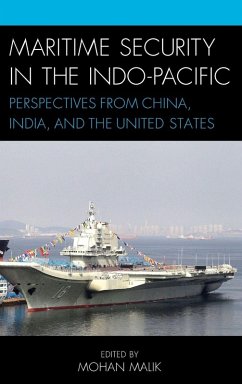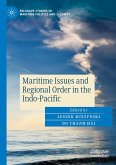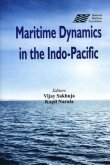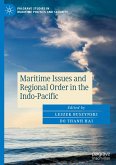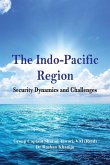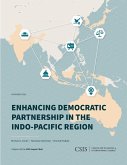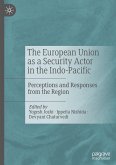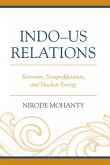Maritime Security in the Indo-Pacific
Perspectives from China, India, and the United States
Herausgeber: Malik, Mohan
Maritime Security in the Indo-Pacific
Perspectives from China, India, and the United States
Herausgeber: Malik, Mohan
- Gebundenes Buch
- Merkliste
- Auf die Merkliste
- Bewerten Bewerten
- Teilen
- Produkt teilen
- Produkterinnerung
- Produkterinnerung
Maritime Security in the Indo-Pacific opens by introducing the Indo-Pacific and outlining the roles of China, India, and the United States in various maritime issues in the region. This volume develops common approaches by focusing on geopolitical challenges, transnational security concerns, and multilateral institution-building and cooperation.
In the twenty-first century, the Indo-Pacific has emerged as a crucial geostrategic region for trade, investment, energy supplies, cooperation, and competition. It presents complex maritime security challenges and interlocking economic interests…mehr
![Maritime Issues and Regional Order in the Indo-Pacific Maritime Issues and Regional Order in the Indo-Pacific]() Maritime Issues and Regional Order in the Indo-Pacific33,99 €
Maritime Issues and Regional Order in the Indo-Pacific33,99 €![Maritime Dynamics in the Indo-Pacific Maritime Dynamics in the Indo-Pacific]() Maritime Dynamics in the Indo-Pacific54,99 €
Maritime Dynamics in the Indo-Pacific54,99 €![Maritime Issues and Regional Order in the Indo-Pacific Maritime Issues and Regional Order in the Indo-Pacific]() Maritime Issues and Regional Order in the Indo-Pacific33,99 €
Maritime Issues and Regional Order in the Indo-Pacific33,99 €![The Indo Pacific Region The Indo Pacific Region]() The Indo Pacific Region35,99 €
The Indo Pacific Region35,99 €![Enhancing Democratic Partnership in the Indo-Pacific Region Enhancing Democratic Partnership in the Indo-Pacific Region]() Michael J. GreenEnhancing Democratic Partnership in the Indo-Pacific Region63,99 €
Michael J. GreenEnhancing Democratic Partnership in the Indo-Pacific Region63,99 €![The European Union as a Security Actor in the Indo-Pacific The European Union as a Security Actor in the Indo-Pacific]() The European Union as a Security Actor in the Indo-Pacific88,99 €
The European Union as a Security Actor in the Indo-Pacific88,99 €![Indo-US Relations Indo-US Relations]() Nirode MohantyIndo-US Relations70,99 €
Nirode MohantyIndo-US Relations70,99 €-
-
-
In the twenty-first century, the Indo-Pacific has emerged as a crucial geostrategic region for trade, investment, energy supplies, cooperation, and competition. It presents complex maritime security challenges and interlocking economic interests that require the development of an overarching multilateral security framework. This volume develops common approaches by focusing on geopolitical challenges, transnational security concerns, and multilateral institution-building and cooperation. The chapters, written by practitioners, diplomats, policymakers, and scholars from the three major powers discussed (United States, China, India) explain the opportunities and risks in the Indo-Pacific region and identify specific naval measures needed to enhance maritime security in the region.
Hinweis: Dieser Artikel kann nur an eine deutsche Lieferadresse ausgeliefert werden.
- Produktdetails
- Verlag: Globe Pequot Publishing Group Inc/Bloomsbury
- Seitenzahl: 312
- Erscheinungstermin: 24. September 2014
- Englisch
- Abmessung: 235mm x 157mm x 23mm
- Gewicht: 659g
- ISBN-13: 9781442235328
- ISBN-10: 1442235322
- Artikelnr.: 40924188
- Herstellerkennzeichnung
- Books on Demand GmbH
- In de Tarpen 42
- 22848 Norderstedt
- info@bod.de
- 040 53433511
- Verlag: Globe Pequot Publishing Group Inc/Bloomsbury
- Seitenzahl: 312
- Erscheinungstermin: 24. September 2014
- Englisch
- Abmessung: 235mm x 157mm x 23mm
- Gewicht: 659g
- ISBN-13: 9781442235328
- ISBN-10: 1442235322
- Artikelnr.: 40924188
- Herstellerkennzeichnung
- Books on Demand GmbH
- In de Tarpen 42
- 22848 Norderstedt
- info@bod.de
- 040 53433511
Domain: Challenges and Opportunities MOHAN MALIK, APCSS PART I: MAPPING THE
INDO-PACIFIC REGION Chapter 2: Mapping the Indo-Pacific? China, India and
the United States RORY MEDCALF, LOWY INSTITUTE Chapter 3: The
"Indo-Pacific" Concept: Implications for China YANG YI and ZHAO QINGHAI,
CIIS PART II: U.S., CHINESE & INDIAN PERSPECTIVES ON MARITIME SECURITY
Chapter 4: Extremely Desirable but Exceptionally Difficult: An American
Perspective SCOTT HAROLD, RAND Chapter 5: Interests and Role in the
Indo-Pacific: A Chinese Perspective ZHAO GANCHENG, SIIS Chapter 6:
Interests & Role in the Indo-Pacific: An Indian Perspective SUREESH MEHTA,
NMF PART III: TRADITIONAL & NON-TRADITIONAL SECURITY CHALLENGES Chapter 7:
Traditional Maritime Security Challenges in China-India and China-U.S.
Relations JEFF M. SMITH, AFPC Chapter 8: Fractured Mirrors: Chinese Views
on Indian Deterrence at Sea LORA SAALMAN, APCSS Chapter 9: Transnational
Maritime Threats and Challenges PROBAL K. GHOSH, ORF Chapter 10: The United
States and Maritime Security Challenges ANDREW C. WINNER, NWC Chapter 11:
China and Transnational Maritime Security Challenges SRIKANTH KONDAPALLI,
JNU PART IV: MULTILATERAL MECHANISMS & COOPERATIVE MEASURES Chapter 12:
Promoting Maritime Cooperation in the Indo-Pacific NIRMAL VERMA, MEA
Chapter 13: Maritime Power, Not Maritime Hegemony YI XIANGLIANG, MoFA
Chapter 14: Multilateral Mechanisms in the Indo-Pacific VIJAY SAKHUJA, ICWA
Chapter 15: The Effectiveness of Cooperative Mechanisms C. UDAY BHASKAR,
NMF Chapter 16: The U.S. Pivot to the Indo-Pacific: Imperatives, Challenges
& Cooperation LOU CHUNHAO, CICIR and ZHANG HAIWEN, CIMA Chapter 17:
America's Patchwork of Coalitions JAMES HOLMES, NWC
Domain: Challenges and Opportunities MOHAN MALIK, APCSS PART I: MAPPING THE
INDO-PACIFIC REGION Chapter 2: Mapping the Indo-Pacific? China, India and
the United States RORY MEDCALF, LOWY INSTITUTE Chapter 3: The
"Indo-Pacific" Concept: Implications for China YANG YI and ZHAO QINGHAI,
CIIS PART II: U.S., CHINESE & INDIAN PERSPECTIVES ON MARITIME SECURITY
Chapter 4: Extremely Desirable but Exceptionally Difficult: An American
Perspective SCOTT HAROLD, RAND Chapter 5: Interests and Role in the
Indo-Pacific: A Chinese Perspective ZHAO GANCHENG, SIIS Chapter 6:
Interests & Role in the Indo-Pacific: An Indian Perspective SUREESH MEHTA,
NMF PART III: TRADITIONAL & NON-TRADITIONAL SECURITY CHALLENGES Chapter 7:
Traditional Maritime Security Challenges in China-India and China-U.S.
Relations JEFF M. SMITH, AFPC Chapter 8: Fractured Mirrors: Chinese Views
on Indian Deterrence at Sea LORA SAALMAN, APCSS Chapter 9: Transnational
Maritime Threats and Challenges PROBAL K. GHOSH, ORF Chapter 10: The United
States and Maritime Security Challenges ANDREW C. WINNER, NWC Chapter 11:
China and Transnational Maritime Security Challenges SRIKANTH KONDAPALLI,
JNU PART IV: MULTILATERAL MECHANISMS & COOPERATIVE MEASURES Chapter 12:
Promoting Maritime Cooperation in the Indo-Pacific NIRMAL VERMA, MEA
Chapter 13: Maritime Power, Not Maritime Hegemony YI XIANGLIANG, MoFA
Chapter 14: Multilateral Mechanisms in the Indo-Pacific VIJAY SAKHUJA, ICWA
Chapter 15: The Effectiveness of Cooperative Mechanisms C. UDAY BHASKAR,
NMF Chapter 16: The U.S. Pivot to the Indo-Pacific: Imperatives, Challenges
& Cooperation LOU CHUNHAO, CICIR and ZHANG HAIWEN, CIMA Chapter 17:
America's Patchwork of Coalitions JAMES HOLMES, NWC

